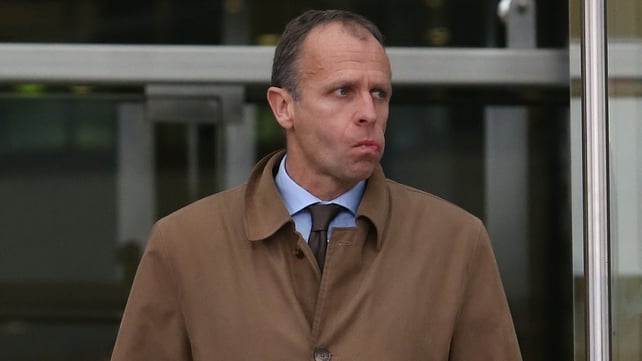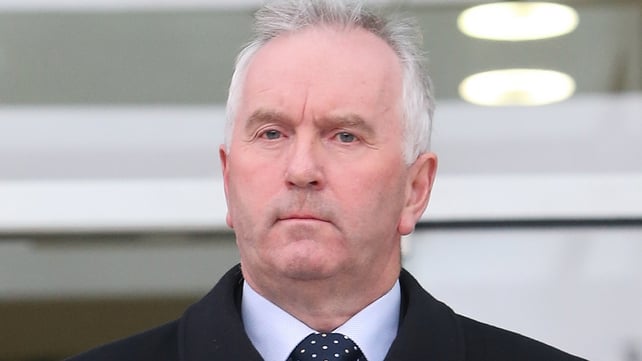Three former Irish bankers charged with €7.2bn fraud in court today


CASE RELATES TO DEPOSITS BETWEEN ANGLO IRISH BANK AND IRISH LIFE & PERMANENT IN 2008
Three former senior bank officials have appeared in court charged in connection with an alleged €7.2 billion fraud.
Former chief executive of Irish Life & Permanent (IL&P)Denis Casey and the bank’s former finance director Peter Fitzpatrick appeared today in the Dublin District Court along with the former head of treasury at Anglo Irish BankJohn Bowe.
The three men were charged with conspiracy to defraud the public under common law.
The charges relate to €7.2 billion in deposits between Anglo Irish Bank and Irish Life & Permanent and Irish Life Assurance in 2008.
In addition, a separate charge was brought against Mr Bowe for false accounting in relation to these deposits in Anglo Irish bank under section 10 of the Theft and Fraud Act.
The three were arrested this morning between 9.25am and 9.45am before being charged at Bridewell Garda station.
After hearing evidence from Detective Inspector Gerry Walsh of the Garda Bureau of Fraud Investigation, Judge Patricia McMahon remanded the three men on bail until March 12th next when a book of evidence will be required to be produced by the Director of Public Prosecutions.
In each case, the bail conditions included a €1,000 cash bond and a €10,000 independent surety.
Each of the men will also be required to sign on at a Garda station once a week for the period of their bail.
They have also been required to give the Garda Bureau of Fraud Investigation 48 hours notice of their intention to travel outside the jurisdiction.
In the case of Mr Fitzpatrick, an exception was granted for him to travel to Northern Ireland for family purposes.
Addicts don’t work ‘18 hours’ to fund charity says Victory Outreach
Victory Outreach defends itself after Prime Time report on fundraising method on Tuesday last.
An evangelical charity which provides residential places for drug addicts has defended its use of cold turkey to treat addicts as well as sending them out to fundraise for it.
RTÉ’s Prime Time last night reported that addicts attempting recovery at Victory Outreach were working “up to 18 hours a day, for no pay, simply to raise money for a charity organisation”.
The RTÉ report said the unregulated organisation did not give chemical assistance or professional counselling to residents, who were told to use prayer.
Victory Outreach began working in Ireland in 1997 and is part of a US-based organisation which operates “churches” in more than 20 countries. Victory Outreach Dublin operates five recovery homes, spokesman Stuart Murphy said.
Mr Murphy told The Irish Times yesterday that residents fundraised voluntarily and money raised was used to fund the organisation which received no State monies. The earliest a team started fundraising was 9.30am or 10am, he said.
Cold turkey
Asked about residents going “cold turkey” Mr Murphy said they were aware of this “when taken in” and there are “no locks on the doors”.
Cold turkey
Asked about residents going “cold turkey” Mr Murphy said they were aware of this “when taken in” and there are “no locks on the doors”.
Mr Murphy said he himself had come through the programme 13 years ago and survived.
There were three basic parts to the programme: restoration of family, a positive work ethic and a relationship with Christ, he said.
He would like to see regulation of treatment organisations “the sooner the better” as they then would not have to “sell raffle tickets” and the staff “might get wages”, he said.
The Department of Health said addiction services which are funded by the HSE are required to meet “minimum standards ”.
Victory Outreach was “not funded by the HSE” and there was “currently no provision” in law for regulation of residential treatment or rehabilitation centres specialising in addiction, it said.
Unlike many other services operating in Dublin, the organisation has no waiting list and will assist most addicts who contact it.
‘Unregulated’
The Prime Time report pointed out there were an estimated 20,000 heroin addicts in the State but just one professionally supervised detox bed for every 400 addicts in Dublin. “This shortage has led addicts to engage with private and unregulated organisations,” RTÉ said in a statement ahead of the programme.
‘Unregulated’
The Prime Time report pointed out there were an estimated 20,000 heroin addicts in the State but just one professionally supervised detox bed for every 400 addicts in Dublin. “This shortage has led addicts to engage with private and unregulated organisations,” RTÉ said in a statement ahead of the programme.
There was “definitely a gap in service provision that needs to be filled,” Tony Duffin, director of the Anna Liffey Drug Project (ALDP) told The Irish Times yesterday. It can be “difficult for people actively using drugs” to access residential treatment as many services require them to reach a level of stability beforehand. ALDP would like to open residential units where people can “refer themselves” based “solely on need” .
According to 2012 accounts registered with the company’s office, the charity, registered as Urban Outreach Limited, had an income of almost €280,000 and a deficit of €13,000. This is made up of donations of more than €168,000 and rental income of almost €111,000. Its main expenditure was rental income of €150,000.
Victory Outreach’s US organisation was subject to controversy last year after a Boston Globe investigation found a contractor was paying illegally low wages to workers from the church to renovate hotels .
Five cent vegetable price wars now very aggressive says Irish Minister Coveney
Agriculture Minister Simon Coveney has said he cannot control the “very aggressive” vegetable price wars which are putting vegetable growers under increasing pressure.
Stores are offering extraordinary bargains like a 1kg bags of onions, potatoes, or carrots for as little as five cents. Brussels sprouts and parsnips are also being offered at the same rock bottom price.
Supermarket giants Lidl, Aldi and Dunnes Stores are dropping prices to unprecedented lows in the bid to win savvy customers.
Mr Coveney said today that new legislation will be introduced to bind supermarkets to the terms of contracts they’ve signed with food producers.
He said he will introduce the mandatory code of conduct “within weeks, if not months” to protect producers from unfair treatment.
“We are seeing at the moment a very aggressive price war where supermarkets are using vegetables as a loss leader to get people into their stores.”
However, he admitted on RTE Radio’s Morning Ireland today that “it’s not going to solve every problem”.
A “worrying situation” has developed in the battle of supermarkets to beat down prices, and “many producers who are reliant on just one retailer so that means they’re very exposed”.
He said the new legislation which will be introduced by the end of February will protect producers.
“It’ll protect primary producers to ensure the contracts they’ve signed are fully respected for the lifetime of the contracts.”
A new protein test made in Ireland can help doctors spot if you are having a heart attack
New tool could reduce time to diagnosis of a cardiac event and it is especially helpful in women.
A Diagnostic test developed and being manufactured in Longford could be an important weapon in the arsenal of doctors trying to assess if someone is having a heart attack.
The test – called the ARCHITECT Stat High Sensitive Troponin-I – is being used at the Mater public and private hospitals in Dublin at the moment and it is hoped that it will be rolled out at other cardiology units across the country.
It is able to measure very low levels of the protein known as cardiac troponin, which indicates someone is having a heart attack. However, previous tests through blood sample could only measure this protein when it reached a certain level, which could delay diagnosis by a few precious hours.
Dr Niall Mahon said that this test – developed by Abbott Longford – could “speed up” the diagnosis of serious heart attacks and help medics to intervene quicker. The speed factor is particularly helpful in diagnosing women who might be having a heart attack as they can show different symptoms from men and are generally under-diagnosed and under-treated for heart attacks.
He said: The high-sensitive assay (test) may help physicians to rule in and rule out acute myocardial injury… the sensitivity of this assay is unique in that it has potential for earlier diagnosis in women.
One in 10 people believe coffee causes cancer (but it does not)
ALMOST 10 PER CENT OF BRITISH ADULTS WRONGLY THINK COFFEE CAUSES CANCER, A NEW STUDY HAS FOUND.
Around one in 10 British adults mistakenly think coffee causes cancer, with 9 per cent of those polled believing that consuming the drink can lead to developing the disease.
“There is no scientific evidence that coffee causes any form of cancer but the latest analysis of research has shown that it can have a preventative effect against womb cancer and there are suggestions it may protect against liver cancer,” the charity said in a statement.
Six per cent say of those surveyed said that coffee can protect against the disease. One in 10 meanwhile, think caffeine can help with weight loss, despite, according to the WCRF, there being no scientific evidence for the assumption.
Furthermore, more than one in five were found to believe caffeine is the “most dangerous” substance in coffee, when the highest health risk associated with the drink is sugar and full-fat milk or cream that is added to it, the charity said.
Dr Rachel Thompson, head of research interpretation at the charity said: “New evidence from our Continuous Update Project (CUP) suggests drinking coffee may decrease the risk of womb cancer, but there are still too many unanswered questions – such as how many cups we should drink, or how regularly – for us to provide any advice on coffee drinking.”
“The CUP has found no consistent evidence that suggests coffee increases or decreases the risk of any other cancers but we are continually reviewing the evidence to see if this changes.”
Geologists find diamond-producing rocks in Antarctica

For the first time ever, geologists working in Antarctica have found a type of rock that’s known to bear diamonds — a discovery that could expose the polar continent to opportunistic prospectors.
Called kimberlite, it’s a volcanic rock named after the town of Kimberley in South Africa, where the discovery of an 83.5-carat (16.7 g) diamond in 1871 kick-started a diamond rush. These rocks appear in vertical structures called kimberlite pipes — the single most important source of mined diamonds today. The rocks were found around Mount Meredith in the Prince Charles Mountains.
The geologists who discovered the kimberlite samples didn’t find any diamonds, but they’re now wondering if the icy continent contains vast mineral riches.
Antarctica is currently off limits to mining. In 1991, 50 signatories signed the Antarctic Treaty, an environmental accord that’s set to expire in 2041. The treaty was put in place as a way to preserve the continent for scientific research and wildlife. The accord, which is only binding to the 50 nations who signed it (including the US and China), is expected to be extended when it expires.
“We do not know what the Treaty Parties’ views will be on mining after 2041 or what technologies might exist that could make extraction of Antarctic minerals economically viable,” said Kevin Hughes, of the Scientific Committee on Antarctic Research.
Mr Riley said there was a fine line between geological mapping and prospecting with an eye to mining. Nations including Russia, Ukraine and China have been more active in surveying Antarctica in recent years.
Indeed, if there’s diamonds in them thar icy hills, it won’t be easy to extract. The geologists who conducted the study doubt that the find could be commercially viable, citing Antarctica’s remoteness, cold, and winter darkness. But where there’s a will — or profit — there’s a way.




No comments:
Post a Comment